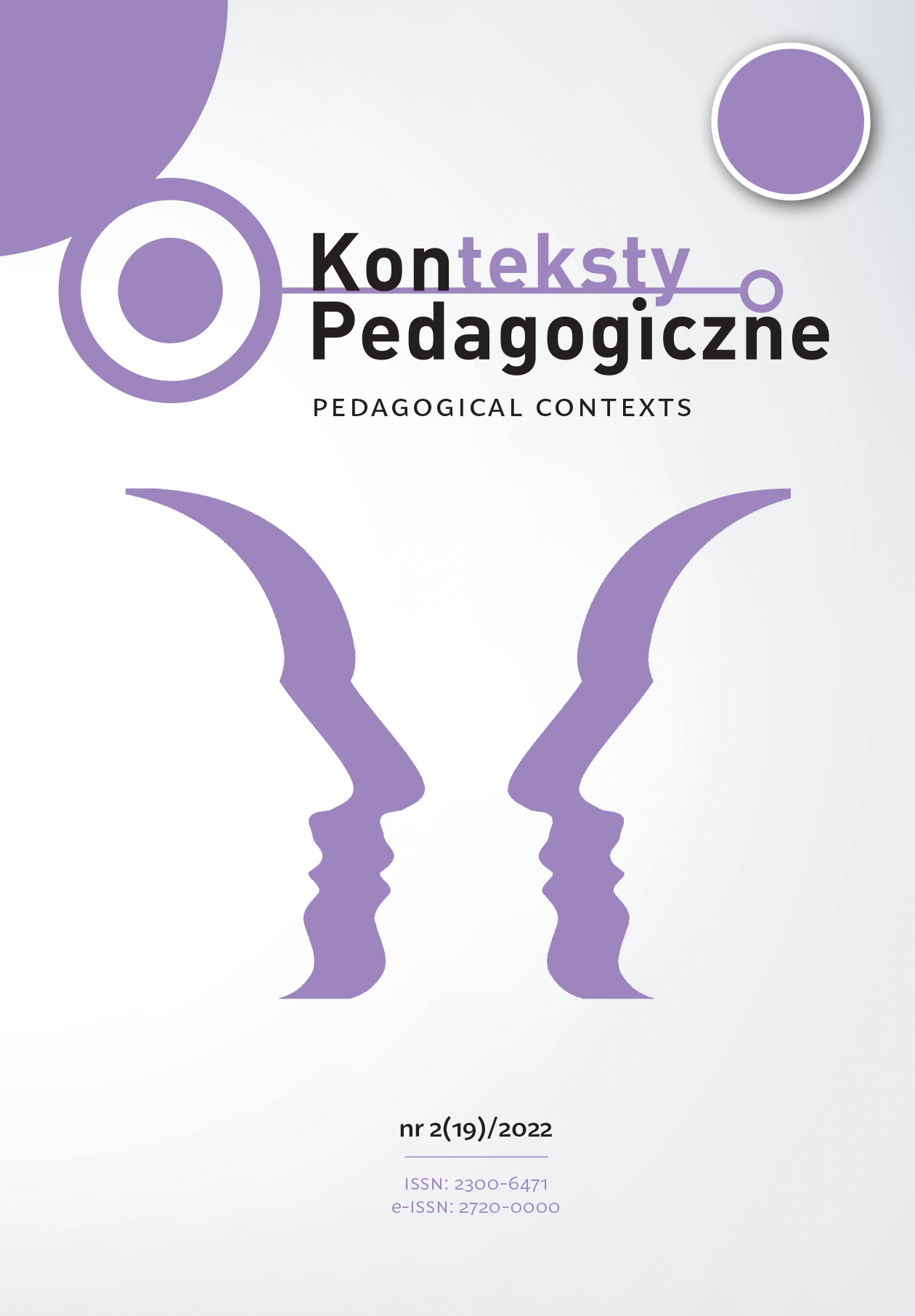Abstract
This article is about the situation of people with the autism in higher education environment and the ways in which a university can effectively support such learners in their studies. It was inspired by a study visit to Dublin City University – the first Autism Friendly University in Ireland and in the world. The main postulate of the article is that the presence of people with the autism spectrum creates new challenges for universities, and that the traditional model of supporting them is no longer sufficient. Creating an academic ecosystem in which persons with different functioning profiles are able to find their place and develop their potential requires a synergy of several elements: accommodation of the teaching process, innovative ways of support that take into account the student's well-being, modification of the infrastructure, and awareness and openness of the whole academic community to the needs of persons with the autism spectrum.
References
Bakker, T., Krabbendam, L., Sandjai, B. i Begeer, S. (2019). Background and Enrollment Characteristics of Students with Autism. Research in Autism Spectrum Disorders, 67, 1‒12. DOI:10.1016/j.rasd.2019.101424.
Cai, R.Y. i Richdale, A.L. (2016). Educational Experiences and Needs of Higher Education Students with Autism Spectrum Disorder. Journal of Autism and Developmental Disorders, 46(31), 31‒41. DOI:10.1007/s10803-015-2535-1.
Chapman, R. i Veit, W. (2020). Representing the Autism Spectrum. The American Journal of Bioethics, 20(4), 46‒48. DOI:10.1080/15265161.2020.1730495.
Cierzeniewska, R. (2021). Neuroróżnorodność studentów w uczelni wyższej w dyskursie kompensacyjno terapeutycznym i dyskursie otwierania potencjału. Część I. Horyzonty Wychowania, 20(56), 119‒132. DOI: 10.35765/hw.2154.
Cierzeniewska, R. i Podgórska-Jachnik, D. (2021). Kategorie otwierające na neuroróżnorodność studentów. Pedagogiczne studium kontekstów edukacyjnych. Studia Pedagogica Ignatiana, 24(5), 15‒42. DOI:10.12775/SPI.2021.5.00.
DCU Autism Friendly. Sensory Pods, https://www.dcu.ie/autism-friendly/sensory-pods, [dostęp: 1.12.2022].
Drabata, A. (2021). (Re)definicja myślenia na temat procesów kognitywnych – zwrot w postrzeganiu osób z ASD. Niepełnosprawność. Dyskursy Pedagogiki Specjalnej, 41, 11‒32, https://czasopisma.bg.ug.edu.pl/index.php/niepelnosprawnosc/article/view/6312 [dostęp: 1.12.2022].
Drzazga-Lech, M., Kłeczek, M. i Ir, M. (2021). Różne sposoby definiowania autyzmu. Przegląd stanowisk. Acta Universitatis Lodziensis. Folia Sociologica, 79, 49‒62. DOI: 10.18778/0208-600X.79.03.
Hope, J. (2022). Create a University that’s Autism Friendly. Disability Compliance for Higher Education, 28(3), 1‒5. DOI: 10.1002/dhe.31364.
Kenny, L., Hattersley, C., Molins, B., Buckley, C., Povey, C. i Pellicano, E. (2016). Which Terms Should be Used to Describe Autism? Perspectives from the UK Autism Community. Autsim, 20(4), 442–462. DOI: 10.1177/1362361315588200.
Mazurek, M. (2014). Loneliness, Friendship, and Well-Being in Adults with Autism Spectrum Disorders. Autism, 18(3), 223‒232. DOI: 10.1177/1362361312474121.
Mostafa, M. (2021). The Autism Friendly University Design Guide, https://www.research-gate.net/publication/351936605_THE_AUTISM_FRIENDLY_UNIVERSITY_DESIGN_GUIDE [dostęp: 2.12.2022].
Najwyższa Izba Kontroli. (2020). Wsparcie osób z autyzmem i zespołem Aspergera w przygotowaniu do samodzielnego funkcjonowania, https://www.nik.gov.pl/plik/ id,22196,vp,24863.pdf [dostęp: 2.12.2022].
Otapowicz, D. (2021). Bariery w edukacji osób z autyzmem. W: A. Karpińska, W. Wróblewska i P. Remża (red.), Edukacja zorientowana na ucznia i studenta (s. 255‒269). Białystok: Wydawnictwo UwB. DOI: 10.15290/eznuis.2021.15.
Pawlik, S. (2019). Diagnoza spektrum autyzmu u osób dorosłych jako biograficzny przełom. Kultura i Edukacja, 23(1), 216–229. DOI: 10.15804/kie.2019.01.13.
Pawlik, S. (2022). Studium zaangażowania młodzieży ze spektrum autyzmu. Wychowanie w Rodzinie, XXVII (2), 299‒313. DOI: 10.34616/wwr.2022.2.299.313.
Uniwersytet Warszawski. Autism&Uni, https://poradnik.bon.uw.edu.pl/ [dostęp: 2.12.2022].
Scott, M. i Sedgewick, F. (2021). ‘I Have More Control Over My Life’: A Qualitative Exploration of Challenges, Opportunities, and Support Needs among Autistic University Students. Autism & Developmental Language Impairments, 6, 1‒14. DOI: 10.1177/23969415211010419.
Stefańska-Klar, R. (2010). Studenci z autyzmem i zespołem Aspergera. Funkcjonowanie, przyczyny sukcesów i porażek, warunki skutecznego wspierania. W: I. Bieńkowska (red.), W kręgu resocjalizacji i wybranych zagadnień rozwoju oraz funkcjonowania osób niepełnosprawnych (s. 91‒107). Gliwice‒Kraków: Wydawnictwo „Scriptum”.
Straus, J.N. (2013). Autism as Culture. W: L.J. Davis (red.), The Disability Studies Reader (s. 460‒484). London: Routledge.
Sweeney, M., Burke, T., Quinn, K. i Harris, A. (2018). Living with Autism as a University Student at Dublin City University: Developing an Autism Friendly University. Dublin: Dublin City University, https://doras.dcu.ie/23340/1/Final%20Report%20 autism%20friendly%20university%20project.pdf [dostęp: 1.12.2022].
Van Hees, V., Roeyers, H. i De Mol, J. (2018). Students with Autism Spectrum Disorder and Their Parents in the Transition into Higher Education: Impact on Dynamics. Journal of Autism and Developmental Disorders, (48), 3296–3310. DOI: 10.1007/s10803-018-3593-y.
Ward, D. i Webster, A. (2017). Understanding the Lived Experiences of University Students with Autism Spectrum Disorder (ASD): A Phenomenological Study. International Journal of Disability, Development and Education, 65(4), 373–392. DOI:10.1080/1034912X.2017.1403573.
Uniwersytet Śląski w Katowicach (2021). Student, https://us.edu.pl/student/spolecznosc-dla-osob-ze-spektrum-autyzmu/ [dostęp: 1.12.2022].

This work is licensed under a Creative Commons Attribution-ShareAlike 4.0 International License.
Copyright (c) 2022 Pedagogical Contexts

